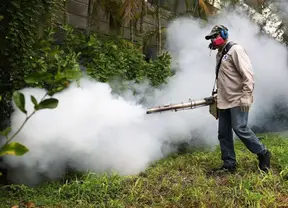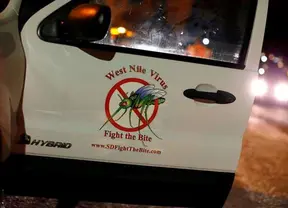
Yourgrandmother'sinsistencethatyoureceivemoremosquitobitesbecauseyou're"sweeter"maynotbethatfar-fetchedafterall.ResearchersreportingintheU.S.journalCurrentBiolo

Stealthymosquitoeshaveevolvedasneakymechanismtoavoidbeingdetectedwhentakingofffromtheirprey,scientistshavediscovered.Unlikeotherinsects,whichpushofffromtheirlan

BrazilianscientistsonTuesdaybegantounleashthefirstofmillionsofmosquitoesinfectedwithabacteriameanttopreventtheinsectsfromtransmittingthedenguevirustohumans.Thou

RagingdenguefeveracrossVietnamthisyearhascaused24deathsandmorethan81,000infectionsofthemosquito-bornevirus,thecountry'sMinistryofHealthclaimedonWednesday.Asthe

Isitnecessaryforbadguystobeawareofmosquitoeswhencommittingacrime?Theanswermightbe"yes"now.ResearchersfromJapan'sNagoyaUniversityandSaitamaMedicalUniversityhaved

A bipartisan coalition of Florida politicians has urged the United States government to step up efforts to fight Zika, including sanctioning the emergency use of genetically engineered mosquitoes to battle the disease.

Over Wynwood, the Miami neighborhood where Zika gained a foothold in the continental United States, low flying planes have been spraying naled, a tightly controlled pesticide often used as a last resort. It appears to be working, killing at least 90 percent of the target mosquitoes.

The global public health emergency involving deformed babies emerged in 2015, the hottest year in the historical record, with an outbreak in Brazil of a disease transmitted by heat-loving mosquitoes. Can that be a coincidence?

A novel mosquito trap that lures its prey using human scent and other smells favored by the critter is creating a buzz as Japan frets about the spread of dengue fever, the Asahi Shimbun reported Thursday.

The diet of a small Malaysian spider could hold the key to curbing the spread of some of the world's worst human diseases, such as malaria, according to research by New Zealand, Singaporean, Chinese and Malaysian scientists.